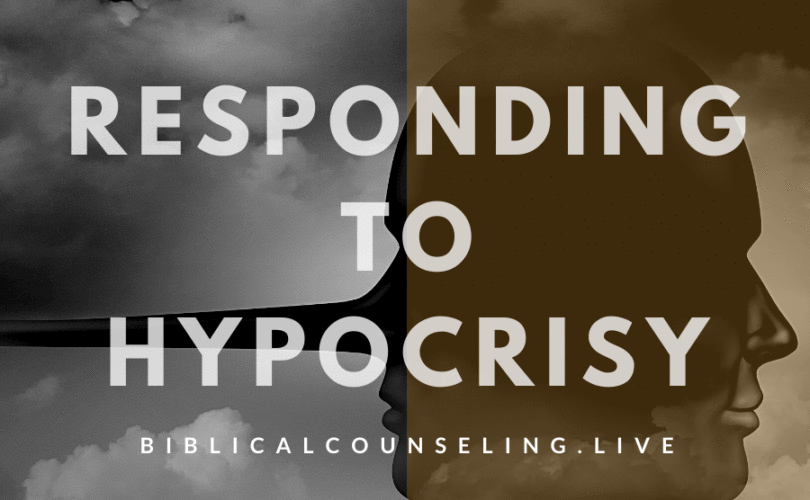In the last week, I was privileged to teach on hypocrisy and authentic living based on the Sermon on the Mount to our MOMs group at church. I was already thinking about it a lot (and being VERY convicted) when within a few days, the governor of our state, Gavin Newsom, was criticized in the media for not personally following the COVID guidelines that his administration has imposed. Hypocrisy is when you hold others to a standard that you yourself don’t keep, and Newson dug himself a bit of a hole on this one.
The response to this situation, in the emotionally-charged mask/shut-down culture of COVID, has been full of anger and bitterness and has caused me to think a lot about what the Bible says not only about hypocrisy itself, but about how we are to respond to hypocritical actions.
Before we think about our biblical response, we must first understand WHY God calls us to live authentically and not hypocritically. In a nutshell, authentic living demonstrates the trustworthiness of the person in authority, and in the case of gospel truth, adorns the gospel and authenticates the speaker.
For example, if a church leader says that one should not commit adultery and then gets caught in adultery, can you trust that leader’s motives, salvation, and ability to lead you spiritually? Probably not. On the other hand, if a church leader says that you should submit in your workplace — be well-pleasing, not argumentative, not stealing, but working hard as onto the Lord — and you see him modeling this in his own workplace, you immediately trust and respect this leader (Col. 3:22-24). It also opens the door for him to share the gospel with unbelievers because they know he is authentic (his words and actions line up) and they see the power of the gospel at work in his life, making him different than everyone else.
Likewise urge the young men to be sensible; in all things show yourself to be an example of good deeds, with purity in doctrine, dignified, sound in speech which is beyond reproach, so that the opponent will be put to shame, having nothing bad to say about us. Urge bondslaves to be subject to their own masters in everything, to be well-pleasing, not argumentative, not pilfering, but showing all good faith so that they will adorn the doctrine of God our Savior in every respect.
Titus 2:6-10
Whether we see hypocrisy in a friend, or in a church leader, or in a governmental authority, here are some Simple Steps to think through as you process hypocrisy:
1) Examine why the hypocrisy upsets you
Most of the time hypocrisy upsets us because we want to do exactly what the hypocrite did. Therefore, when we sacrifice our desires and idols to obey a requirement that we don’t want to obey, we feel cheated out of our reward for our sacrifice when others “get away” with not following the rule. This reveals our true heart — that we are really just submitting in order to please man and we are not submitting in order to please the Lord (Matt. 6:1, 10:28, 1 Pet. 2:13-16). We are not actually concerned about the sin of the hypocrite, and how that sin dishonors the Lord (Ps. 51:4); we are concerned about ourselves. Ironically, we prove that we are just as hypocritical as the person who “got caught” (Matt. 7:1-6).
- Step 1: Evaluate your own heart, and repent of your own hypocrisy and lack of true, whole-hearted submission to the Lord. Examine your own motives for choosing to obey authority. Are you submitting as onto the Lord?
2) Don’t assume you know the motives of the hypocrite
Scripture tells us that we will know what is in a man’s heart by his actions (Matt. 7:16-20). However, the motive behind any one act can be different for each person. So in the case of Newsom, what was the motive behind his hypocritical act? Was it fear of man which caused him to be afraid to turn down the invitation to the party because his friends might shun him? Was it a desire for gluttonous indulgence because of that particular restaurant? Was it a sinful view of his power or importance?
Unless I talk to him personally and he’s able to articulate it, I don’t actually know, and to assume that I do is unkind and unbiblical (Jer. 17:9). Have you ever had someone say to you, “I know why you did that!” and they have it ALL WRONG? This is because each of us a complex being with a complex set of idols. Assuming you know the motive behind someone else’s actions harms the relationship with that person and hinders reconciliation.
We cross a line, however, when we begin to sinfully judge others, which is characterized by a feeling of superiority, indignation, condemnation, bitterness, or resentment. Sinful judging often involves speculating on others’ motives. Most of all, it reveals the absence of a genuine love and concern toward them.
The Peacemaker by Ken Sande, p. 107
Scripture is very clear that when we see someone in sin, we are to go directly to that person and talk to him (Matt. 18:15). Our goal in pointing out sin is not to stand as accuser and judge, but rather to enter into a relationship with that person where we can discern their heart motives and with the help of the Holy Spirit bring them to repentance (Gal. 6:1, Jam. 5:19-20).
- Step 2: Go to the person privately, and discuss the issue. Ask lots of questions and listen. If you don’t have an audience with that person (like a state governor), pray for that person and choose to believe the best (1 Cor. 13:4-7). Remember that he/she is a sinner just like you in need of a Savior (1 Cor. 10:13), and pray that God will send someone who has access to that person to show the person his/her sin.
3) Remember that a hypocritical messenger doesn’t change truth
If Hitler said that murder was wrong, would you use that as proof that murder was right? When the Pharisees in Jesus’s day told the Jews that God must be worshipped, did their lack of proper worship prove that God shouldn’t be worshipped? If a police officer doesn’t stop at a stop sign, does that mean that now no one should stop at a stop sign?
In the world of argumentation/rhetoric, this faulty reasoning is called a “genetic fallacy” or a “fallacy of origin” or a “fallacy of virtue.” Basically, it argues that the truth of a statement is based on the actions of the person uttering the statement and not on the merit of the statement itself. As Christians we know that truth is truth because God says it. It doesn’t matter if a sinful person with the wrong motives says it, or if a sinful person doesn’t obey it (Matt. 23:2-3, Phil. 1:15-18).
When someone in authority does not adhere to a rule, guideline, or law that does not change the truth or legitimacy of the rule, guideline, or law. In the case of Governor Newsom, the state guidelines for social distancing stand apart from anything Newsom does or says (Rom. 13:1-5). If a pastor commits adultery, that does not change God’s Word about adultery (Exo. 20:14, Matt. 5:27-28). If a mother yells at her kids in anger, it does not change the fact that the children should not yell in anger (Matt. 5:21-22).
- Step 3: Evaluate the rule, guideline, or law based on God’s Word. Seek to obey God by submitting to the authorities in your life (as long as they aren’t asking you to sin (Acts 5:28-29)), whether or not they are hypocritical (Rom. 3:8).
When we see hypocritical actions in the lives of those around us, our response should first be kindness and compassion (Matt. 9:12-13). If we understand the depth of our own sin and our own hypocrisy, we can easily have compassion on others who struggle with the same thing (1 Cor. 6:11). This does not mean that we do not acknowledge and confront the sin, but it should be done in a way that speaks the truth in love (Eph. 4:15). This then allows us to restore our sinning brother-in-Christ or to preach the gospel to an unsaved person in need of a Savior.
Therefore you have no excuse, everyone of you who passes judgment, for in that which you judge another, you condemn yourself; for you who judge practice the same things. And we know that the judgment of God rightly falls upon those who practice such things. But do you suppose this, O man, when you pass judgment on those who practice such things and do the same yourself, that you will escape the judgment of God? Or do you think lightly of the riches of His kindness and tolerance and patience, not knowing that the kindness of God leads you to repentance?
Romans 2:1-4

